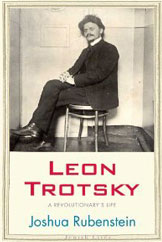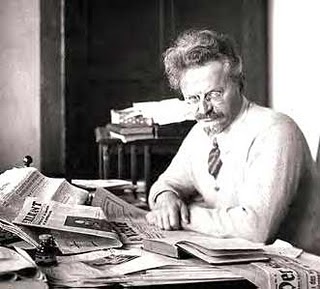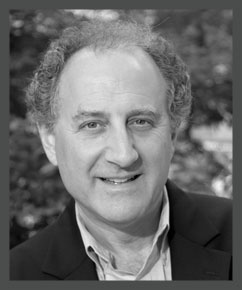Short Fuse Review/Interview: Trotsky’s Revolutionary Life
Joshua Rubenstein’s succinct account of Leon Trotsky’s life rescues the Russian radical from a remoteness, positioning him at a useful distance for contemporary readers.
Leon Trotsky: A Revolutionary Life by Joshua Rubenstein, Yale University Press, 240 pages, $25.
Who was Leon Trotsky?
Today, this is hardly the burning question it was when Joseph Stalin had Trotsky—born Lev Bronstein—imprisoned, exiled, and finally, after one crudely botched attempt, murdered in Mexico City in 1940. Nor can it excite the imagination as it did Isaac Deutscher’s when he penned his monumental, three part biography cum hagiography—The Prophet Armed: Trotsky, 1879-1921, The Prophet Unarmed: Trotsky, 1921-1929, The Prophet Outcast: Trotsky, 1929-1940—some 50 years ago.
Today, Trotsky’s name comes up most often in accounts of debates in New York’s City College cafeteria in the 1930s, among those, such as Irving Kristol, for whom Trotskyism was a way station out of Marxist dialectic toward neoconservative dogma. Trotsky does still occupy a humble place in popular culture, as evidenced by the sweet, smart Canadian film The Trotsky (2009), in which a Montreal high school student who happens to be named Leon Bronstein believes himself to be a reincarnation of the Bolshevik firebrand and sets out in search of his soul mate, his very own Vladimir Ilyich Lenin. But for the most part, as Marxism goes so goes its Trotskyite variant, and for most of us, Marxism, in all its tortured variants, is increasingly archaic.
Joshua Rubenstein, author of Leon Trotsky: A Revolutionary Life, acknowledges this when he writes: “Nearly a century after the Bolshevik Revolution and decades after his death, Leon Trotsky and the ideas that animated his life . . . seem increasing remote.” But Rubenstein’s succinct account also rescues Trotsky from that remoteness, positioning him at a useful distance for contemporary readers. And with his Trotsky comes a crucial chunk of twentieth-century history: the Bolshevik Revolution of 1917—in which Trotsky played a role barely second to Lenin’s—and its all too rapid transition into the Communist police state that crumbled two decades ago.
Rubenstein notes that Trotsky foresaw the results of Bolshevism as early as 1904, when he was not in accord with Lenin’s strident insistence on one party rule, and wrote, “Lenin’s methods lead to this. . . the party organization at first substitutes itself for the party as a whole, then the Central Committee substitutes itself for the organization; and finally a single ‘dictator’ substitutes himself for the Central Committee.”
Yet, after Lenin’s death in 1924, when Russia’s other parties had been suppressed and the reduction to Stalin’s dictatorship was well on its way, Trotsky abjectly proclaimed, “In the last analysis, the party is always right. . . no one can be right against the party. . . since history has not created any other way to determine the correct position.”
Born in 1879 into a Ukrainian Jewish family, Trotsky always disavowed any connection to the Jewish people. For him, writes Rubenstein, “The Jews were just another small, persecuted minority.” But it’s hard to miss how much Trotsky’s prostration before the Communist Party resembles obeisance toward religious authority. In Rubenstein’s view, as Trotsky abjured the Jewish belief in a messianic age “he adopted an alternative utopian faith—one that was secular and far more dangerous.”
It was perhaps only the distance afforded by exile from the Soviet Union that allowed Trotsky to plainly see that the Communist Party was far from always right and that under Stalin it was more often catastrophically wrong. In the 1930s, when all of Russia’s other parties had been suppressed, Stalin set about purging the Communist Party of every point of view but his own and exported a disastrous version of this policy to Germany. As Hitler closed in on state power, Stalin barred Germany’s Communists from joining with its Social Democrats against the Nazis. Communists and Socialists together comprised a portion of the population that might have made a stand against Hitler. But with Communists attacking Socialists as mortal enemies—”social fascists”—the results, as Trotsky recognized, “were tragic and entirely foreseeable.”
Trotsky had once told a Moscow rabbi “I am not a Jew. I’m a Marxist internationalist. I have nothing in common with Jewish things.” Still, as per Rubenstein, he was “among the first to foresee that Hitler’s triumph would spell disaster for his fellow European Jews.” In 1938 he directed his followers to understand that “the next development of world reaction signifies almost with certainty the physical extermination of the Jews.” But even at that late date Trotsky could not abjure Bolshevism, defending its “monopoly of power and resort to revolutionary terror.”
“History is full of such tragic heroes,” concludes Rubenstein. “They dream of justice and then wreak havoc.”
Joshua Rubenstein is Northeast Regional Director of Amnesty International. Our paths crossed in 1968 during the student occupation of buildings at Columbia University. We had the following exchange about Lev Bronstein.
Arts Fuse: Your Trotsky bio is part of a Yale Jewish Lives series, which includes biographies of Hank Greenberg and Emma Goldman. Would your book have been different it were not part of that series?
Joshua Rubinstein: The editors of the Jewish Lives series approached me because of my earlier work on the Soviet Jewish writer Ilya Ehrenburg. They liked the way I described his attitudes in the face of both Nazi and Soviet anti-Semitism.
Fuse: How did your own Jewishness influence this work?
JR: I was raised in a kosher home and attended a Conservative Jewish religious school. I do not regard myself as particularly religious, even though I continue to keep kosher and mark holidays to some extent.
Trotsky regarded his Jewish origins as an accident and had little if any attachment to Jewish traditions. Though my upbringing and attitudes are different, I did not seek to judge or condemn him for his. As a biographer, I see my role as someone who seeks to understand and to explain the life I am exploring.
Fuse: Your book brings up a basic question: had the Bolsheviks not seized power in 1917, would some sort of democratic system have emerged? Or would Tsarism, fueled by the force of the anti-Semitic Black Hundreds, have prevailed?
JR: I can say with certainty that even before the execution of the Tsar in 1918, the Romanov dynasty was fully overthrown and had no chance of returning to power. But the Provisional Government simply did not have the leadership necessary to deal with the country’s problems. Perhaps if it had worked more strenuously to get out of the war, and pursue land reform, it could have garnered more credibility among the population. But its measures were half-hearted. The Bolsheviks saw the opportunity and seized it.
Fuse: Was it a case, then, of either Bolshevism or chaos? A Constituent Assembly was coming into being, representing many parties. World War I was going to end in any case, and pretty soon, with Germany’s defeat. Was a post-war parliamentary system for Russia out of the question?
JR: The Bolsheviks would not permit it. Throughout 1917, there was broad support for a Constituent Assembly, but once it was suppressed by the Bolsheviks in 1918, there was no hope for a democratic outcome. Lenin and the Bolsheviks overrode the resistance of their opponents—and their erstwhile socialist allies. The Whites were no less ruthless, but they represented a lost, hopeless cause. The monarchy they fought for could not be revived.
Bolshevik triumph was not inevitable. The Provisional Government could have pursued different policies—social and military—but failed to do so.
Fuse: Before the Bolshevik takeover, Lenin and Trotsky had often disagreed. You quote a friend of Trotsky’s who described a transformation in him after 1917. She said that he was trying prove himself, trying to catch up, to “outdo in zeal and ardor the Bolsheviks themselves. . . by becoming more intransigent, more revolutionary, more Bolshevik than any of them.”
Didn’t we see the same sort of process at work in our generation of activists?
JR: There was pressure on our generation of activists to demonstrate allegiance, to follow the lead of the most radical on our campuses. I saw this at Columbia in 1968 and in 1970. I resisted this urge and challenged it. Some in SDS [Students for a Democratic Society] liked to say, “Nothing radicalizes like the Cossack’s knout.” They were happy to see New York police storm the campus.
Fuse: Wasn’t there something close to deranged about Trotsky’s brand of utopianism? You quote him writing in Literature and Revolution (1924) that “The average human type will rise to the heights of an Aristotle, a Goethe, or a Marx. And above this ridge new peaks will rise.”
Didn’t this kind of thinking give the Bolsheviks license to do anything they deemed necessary to drive people to “new peaks”?
JR: Trotsky’s faith in Marxist revolution was suffused with that utopian fervor. With the revolution he was convinced that all aspects of human society would dramatically improve, including human nature. This faith, combined with the Bolsheviks’ determination to hold onto power, made the regime, including Trotsky, all the more ruthless.
Fuse: How does this book connect to your work with Amnesty International?
JR: Once Lenin and Trotsky decided to reject democratic values, dictatorship was inevitable.
Would rule by Trotsky have been better than rule by Stalin? George Orwell had his doubts. In 1939 he wrote that “[Trotsky] is probably as much responsible for [the Russian dictatorship] as any man now living, and there is no certainty that as a dictator he would be preferable to Stalin, though undoubtedly he has a much more interesting mind.”
Trotsky’s story affirms my steadfast belief in civil liberties and human rights.



